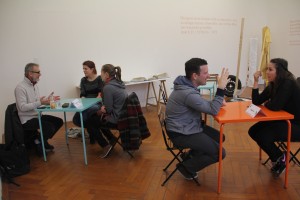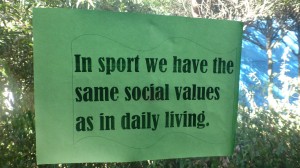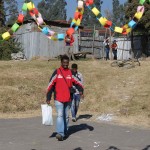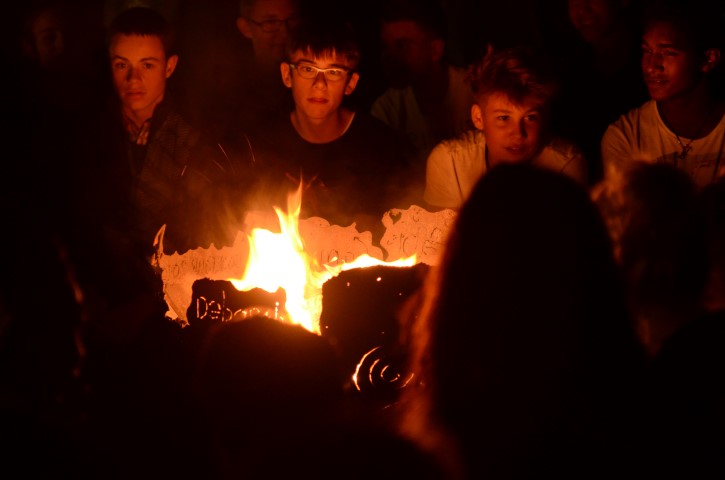
Behailu (Bild der letztjährigen Broschüre)
In Äthiopien versuchen wir für jedes Kind individuelle, situationsgerechte Lösungen zu finden, um eine nachhaltige Wirkung zu erzielen. Der zunehmende Anteil von Strassenkindern in Addis Abeba, die aus ländlichen Gebieten Äthiopiens stammen, stellt uns diesbezüglich vor neue Herausforderung. Behailu (Bild rechts), der letztes Jahr in einer Broschüre von Sport – The Bridge porträtiert wurde, ist ein Beispiel dafür. Mit seiner Geschichte möchten wir die aktuellen Herausforderungen sowie allgemeine Schwierig-keiten in der Arbeit mit (Strassen)kindern aufzeigen.
Beitrag von Lilyana Ahmed, Thierry Graf und Aurelia Golowin
Hintergrund
Seit 2004 verfolgt Sport – The Bridge in Äthiopien mit dem Programm “Äthiopien – Sport baut Brücken” das Ziel der Reintegration von Strassenkindern in ihr familiäres Umfeld und die öffentliche Schule. Die maximal ein Jahr dauernde intensive Betreuung der Kinder durch unser Tagesprogramm (“Erstjahresprogramm”) stellt dabei nur den ersten Schritt dar. Die Kinder und Jugendlichen sowie deren Familien werden weiterhin begleitet, um ihre neue Situation längerfristig zu stabilisieren und sie beim Meistern von alltäglichen Schwierigkeiten unterstützen zu können (“Follow-up Programm”). Für diesen Prozess ist die Zusammenarbeit mit dem familiären Umfeld ein zentrales Element, da die sozialen Umstände wichtige Einflussfaktoren für den nachhaltigen Erfolg der Integrationsarbeit darstellen.
Bedürfnisorientierter Ansatz
Zentraler Ansatz unserer Arbeit mit Strassenkindern in Äthiopien ist es, die Situation eines Kindes als Ganzes zu erfassen, um die konkreten Umstände zu verstehen und so individuelle, den Bedürfnissen jedes Kindes entsprechende Lösungen zu finden. Es existiert kein Patentrezept, um eine nachhaltige Resozialisierung zu verwirklichen, sondern es wird das methodische Ziel angestrebt, jeden Fall einzeln zu betrachten und Prozesse individuell zu gestalten. Dank den zahlreichen Erfahrungen der letzten 10 Jahre wurde eine Vielzahl unterschiedlicher Massnahmen und Methoden entwickelt, die es ermöglichen, flexibel und wirkungsvoll auf einzelne Situationen einzugehen.
Veränderte Rahmenbedingungen
Seit einigen Jahren stellen wir in Addis Abeba einen zunehmenden Anteil von Strassenkindern fest, die ursprünglich aus anderen Regionen Äthiopiens stammen. Dazu gehören Kinder aus anderen Städten und solche aus ländlichen Gebieten, die ihre Familie mit der Hoffnung auf Erfolg, Reichtum, ein besseres Leben oder anderen Gründen verlassen haben und ihr Glück in Addis Abeba suchen. In der Hauptstadt angekommen, leben sie zu ihrem Schutz in einer Gruppe mit anderen Kindern und versuchen sich auf der Strasse durchzuschlagen. In Anbetracht dieser Veränderungen hat Sport – The Bridge ab 2010 das Erstjahresprogramm auch für Strassenkinder von ausserhalb zugänglich gemacht und dabei erste Erfahrungen sammeln können. In den letzten zwei Jahren hat sich der Anteil dieser Kinder so stark erhöht, dass im 2013 erstmals mehr Kinder durch Sport – The Bridge integriert wurden, die nicht aus Addis Abeba stammen.
Behailus Geschichte
Behailu, den wir in einer letztjährigen Broschüre porträtiert hatten, ist einer von ihnen. Er ist heute 11 Jahre alt und stammt aus der Stadt Hawassa, die rund 200 km von Addis Abeba entfernt ist. Nach dem Tod seiner Eltern machte er sich auf nach Addis Abeba, mit dem Ziel, seinen Lebensunterhalt selber zu verdienen, da seine Grossmutter finanziell nicht mehr für ihn aufkommen konnte. Auf den Strassen Addis Abebas kam er in Kontakt mit Sport – The Bridge und entschied sich im November 2013 in das Erstjahresprogramm einzutreten, um auf diesem Weg das Leben auf der Strasse zu verlassen und zu seiner älteren Schwester nach Hawassa zurückzukehren. Behailu besuchte fortan das tägliche Programm. Mit der Schwester wurde telefonisch Kontakt aufgenommen und geplant, dass Behailu nach Beendigung des Erstjahresprogramms durch Mitarbeitende von Sport – The Bridge zu ihr gebracht werde. Es kam jedoch anders. Eine Bekannte von Behailu, die er von seiner Arbeit her – als Haushaltshilfe an den Wochenenden – kannte, hatte ihm ohne vorgängige Absprache mit Sport – The Bridge den Bus nach Hawassa bezahlt und ihm zusätzlich etwas Geld mitgegeben. Somit fuhr Behailu im August 2014 selbständig nach Hawassa und Sport – The Bridge wurde telefonisch von der Schwester darüber informiert, dass er nun bei ihr sei.

Behailu & Mitarbeiterin im Familiendepartement, Sintayehu Fikru (2014)
Obwohl Behailu gut von seiner Schwester und dem weiteren Umfeld empfangen wurde und ihm seine Schwester für die Regenzeit einen Platz in einer Übergangsschule organisiert hatte, um ihn auf das neue Schuljahr in der öffentlichen Schule vorzubereiten, war diese neue Situation nicht beständig. Rund zwei Monate später ging Behailu wieder von seiner Schwester weg und kehrte auf die Strassen von Addis Abeba zurück, wo er von den Mitarbeitenden von Sport – The Bridge gesehen und angesprochen wurde. Als Grund für seine Rückkehr zum Leben auf der Strasse gab er an, dass er seiner Schwester eine kleinere Menge Geld anvertraut habe, das sie gemäss ihren eigenen Angaben angeblich verloren hätte. Die zuständigen Mitarbeitenden interpretieren dies als unmittelbaren Vorwand, vermuten den wahren Grund jedoch darin, dass Behailu den Verlockungen des Lebens auf der Strasse nicht widerstehen konnte und bereits einen hohen Grad an Selbstständigkeit und Autonomie erreicht hatte. Obwohl Behailu gemäss eigenen Aussagen einsieht, dass das Leben bei seiner Schwester den Zugang zur Schule und einem geregelteren Leben ermöglicht, stellt es für ihn auch den mühsameren und anspruchsvolleren Weg dar als das Leben auf der Strasse. Nicht zu unterschätzen ist dabei auch der Einfluss und die Abhängigkeiten von Substanzen, wie z.B. das Schnüffeln von Leim, was bei Behailu der Fall ist. Obwohl er selber sagt, dass er in Zukunft wieder zu seiner Schwester zurückkehren möchte und ihm Sport – The Bridge dafür bereits mehrmals wieder Unterstützung angeboten hat, lebt Behailu heute nach wie vor auf den Strassen von Addis Abeba und ist bis heute (noch) nicht bei Sport – The Bridge aufgetaucht.
Neue Herausforderungen
Die veränderten Umstände auf den Strassen Addis Abebas stellt das Strassenkinder-Programm von Sport – The Bridge, welches ursprünglich auf Kinder aus Addis Abeba ausgerichtet war, vor neue Herausforderungen. Die Geschichte von Behailu zeigt exemplarisch auf, wo Handlungsbedarf besteht, um bestehende Prozesse zu optimieren und allenfalls neue Massnahmen auszuarbeiten. Im Vergleich mit den Kindern aus Addis Abeba können momentan für die Kinder von ausserhalb nicht dieselben umfassenden Leistungen angeboten werden. Einerseits kann mit Familien aus entfernteren Regionen nicht eng zusammengearbeitet werden, um sie in den Reintegrationsprozess zu involvieren und andererseits können die Kinder und Jugendlichen nicht von einer Nachbetreuung profitieren. Die Veränderungen in der Zusammensetzung der Zielgruppe stellen uns somit hinsichtlich der Ausrichtung und der Ausgestaltung der konkreten Leistungen unseres Programms vor offene Fragen: Wie kann in jedem Fall ein Austausch mit Familienangehörigen sichergestellt werden? Wie können diese Familien in den Resozialisierungsprozess einbezogen werden? Welche Möglichkeiten gibt es, auch den Kindern, die nicht aus Addis Abeba stammen, eine Nachbetreuung zu bieten? Auch hier gibt es keine Patentlösung, doch das Team in Äthiopien ist gewillt, sich dieser Herausforderung zu stellen. Momentan werden erste Ideen gesammelt, um Massnahmen auszuarbeiten, so dass noch im 2015 Pilotprojekte starten können, die auch für diese Kinder eine vergleichbar nachhaltige Lösung anstreben, wie für diejenigen aus Addis Abeba.
Wir sind überzeugt, dass die langjährige Erfahrung und international hoch geschätzte Expertise des lokalen Teams eine hervorragende Ausgangslage darstellen, um sich dieser Herausforderung zu stellen.
Januar 2015







 Der Einladung von Sport – The Bridge (STB) Äthiopien folgte eine Vielzahl von Leuten aus diversen Bereichen, um über die pädagogischen Wirkungsfelder des Sports zu diskutieren. Darunter waren Studierende der Universität von Addis Abeba sowie Vertreterinnen und Vertreter aus lokalen NGOs und Sportverbänden. Lilyana Ahmed, Gesamtleiterin des Programms, die seit 10 Jahren bei STB mitarbeitet und heute immer noch den Bereich der Familienintegration führt, eröffnete die Veranstaltung. Im Anschluss übernahm Lastawusih Tekele, Psychologe des Programms, die Moderation und führte durch den Morgen. Folgende drei Vorträge bildeten die Basis für die weiterführende Diskussion: Ein lokaler Mitarbeiter von Right to Play erzählte über die Arbeit ihrer Organisation und die zahlreichen Projekte in ganz Äthiopien und seinem Engagement, die Öffentlichkeit über das Potential des Sports aufzuklären. Stephan Zihler, Mitbegründer von STB und Verfasser des KRAFT-Modells, erzählte über den Aufbau des Vereins und die Idee hinter der sportpädagogischen Arbeit von STB. Abschliessend berichtete Yonas Mindaye über die aktuelle Umsetzung des KRAFT-Modells im Rahmen der Resozialisierungsarbeit von STB Äthiopien: Einerseits nutzen die Sportlehrer das KRAFT-Modell in Anlehnung an die vorgegebene Struktur, die aus den Themen Körper, Regeln, Akzeptanz, Fairness und Team besteht. Andererseits setzen sie das Instrument der Transfer-Gespräche im Rahmen der einzelnen Lektionen ein, um spezifische Themen zu bearbeiten. So können sie flexibel auf Probleme eingehen, denen die Kinder anhand der sich ständig verändernden Umstände auf den Strassen von Addis ausgesetzt sind.
Der Einladung von Sport – The Bridge (STB) Äthiopien folgte eine Vielzahl von Leuten aus diversen Bereichen, um über die pädagogischen Wirkungsfelder des Sports zu diskutieren. Darunter waren Studierende der Universität von Addis Abeba sowie Vertreterinnen und Vertreter aus lokalen NGOs und Sportverbänden. Lilyana Ahmed, Gesamtleiterin des Programms, die seit 10 Jahren bei STB mitarbeitet und heute immer noch den Bereich der Familienintegration führt, eröffnete die Veranstaltung. Im Anschluss übernahm Lastawusih Tekele, Psychologe des Programms, die Moderation und führte durch den Morgen. Folgende drei Vorträge bildeten die Basis für die weiterführende Diskussion: Ein lokaler Mitarbeiter von Right to Play erzählte über die Arbeit ihrer Organisation und die zahlreichen Projekte in ganz Äthiopien und seinem Engagement, die Öffentlichkeit über das Potential des Sports aufzuklären. Stephan Zihler, Mitbegründer von STB und Verfasser des KRAFT-Modells, erzählte über den Aufbau des Vereins und die Idee hinter der sportpädagogischen Arbeit von STB. Abschliessend berichtete Yonas Mindaye über die aktuelle Umsetzung des KRAFT-Modells im Rahmen der Resozialisierungsarbeit von STB Äthiopien: Einerseits nutzen die Sportlehrer das KRAFT-Modell in Anlehnung an die vorgegebene Struktur, die aus den Themen Körper, Regeln, Akzeptanz, Fairness und Team besteht. Andererseits setzen sie das Instrument der Transfer-Gespräche im Rahmen der einzelnen Lektionen ein, um spezifische Themen zu bearbeiten. So können sie flexibel auf Probleme eingehen, denen die Kinder anhand der sich ständig verändernden Umstände auf den Strassen von Addis ausgesetzt sind.































































































